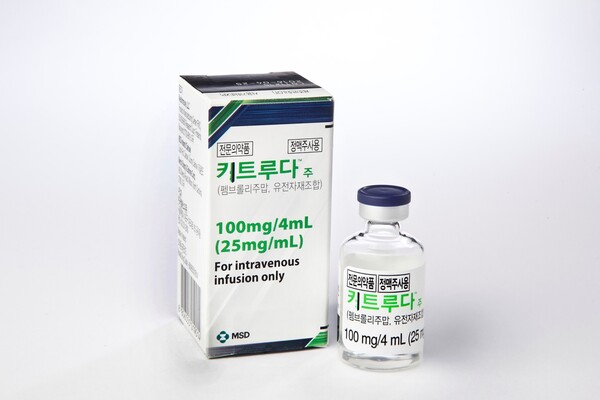MSD, known as Merck & Co. in the U.S. and Canada, is moving its Trop-2-targeting antibody-drug conjugate (ADC) MK-2870 into a phase 3 trial in Korea to test whether pairing it with Keytruda (pembrolizumab) can improve outcomes for patients with mismatch repair-proficient (pMMR) endometrial cancer.
The randomized TroFuse-033 trial will evaluate MK-2870, also known as sacituzumab tirumotecan, in combination with MSD’s checkpoint inhibitor Keytruda as a first-line maintenance therapy.
The regimen will go head-to-head against Keytruda alone across 12 leading Korean hospitals, including Seoul National University Hospital, Asan Medical Center, Samsung Medical Center, Severance Hospital, and the National Cancer Center, with the Korean arm set to enroll 30 adult women.

All participants begin with six cycles of induction therapy that includes Keytruda, carboplatin, and either paclitaxel or docetaxel every three weeks.
Patients whose disease remains stable move to the maintenance phase and are randomized to receive either Keytruda alone or the combination with MK-287. Those whose cancer progresses enter a follow-up phase with either the combo or MK-287 monotherapy.
Unlike their mismatch repair-deficient (dMMR) counterparts, pMMR tumors can repair DNA damage, making them less susceptible to checkpoint inhibition.
That biological resistance has limited treatment options, even after Keytruda won Korean approval in August 2024 for newly diagnosed advanced or recurrent endometrial cancer.
Patients in the pMMR group generally show weaker responses to immunotherapy, Professor Kim Jae-hoon of obstetrics and gynecology at Gangnam Severance Hospital said at an MSD Korea seminar last fall. The challenge, he noted, is that “their cancer cells are still good at fixing DNA damage,” which makes them more difficult to target.
MSD is now hoping its ADC, armed with a cytotoxic payload and engineered to home in on Trop-2, a surface protein overexpressed in multiple tumors, can tip the balance.
Originally developed by China’s Kelun-Biotech, MK-2870 came under MSD’s umbrella in 2022 through a $47 million upfront licensing deal that could top $1.36 billion in milestones.
The drug is already being tested in or nearing late-stage trials for non-small cell lung cancer (NSCLC), triple-negative breast cancer, HR+/HER2- breast cancer, and gastric cancer.
Related articles
- MSD Korea intensifies clinical collaborations to lead oncology innovation
- [BIO KOREA 2025] MSD bets big on Korean biotech for open innovation
- MSD promotes Vaxneuvance ahead of showdown with Pfizer’s Prevnar20 in Korea’s vaccine market
- ‘Keytruda-Padcev combo attains 3-year survival in urothelial cancer, needing expanded coverage’
- Keytruda gets expanded coverage for 11 indications at cancer disease panel
- Keytruda in triple-negative breast cancer faces accessibility challenges in Korea despite promising survival data
- Phase 3 study shows Keytruda's potential in endometrial cancer, though high costs pose barriers
- 'Padcev+Keytruda combo sets new standard for 1st-line urothelial carcinoma treatment'
- MSD Korea wins coverage boost for transplant infection drug Prevymis
- MSD scores Korean approval for pulmonary arterial hypertension drug Winrevair
- Viatris Korea signs exclusive distribution deal with MSD Korea for anesthesia reversal drug Bridion

